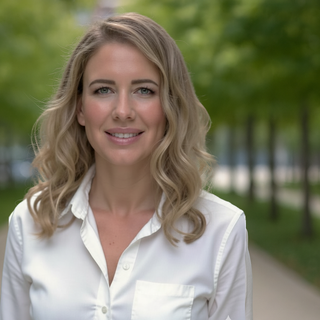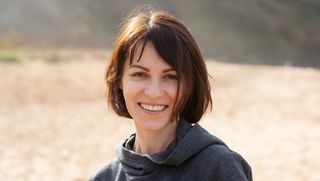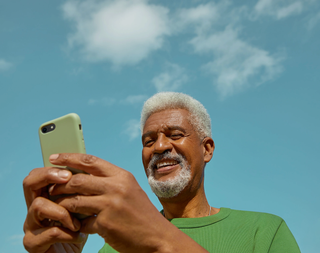Bella's story of adapting to vision loss
Bella's story of coming to terms with and adapting to vision loss.


Summary
When I spoke with Bella, I was really touched by how thoughtfully she shared her story. She was honest, considered, and open about the quiet, often unseen parts of living with vision loss. She describes what so many people find hard to put into words. A journey that’s rarely straightforward, the period of uncertainty that comes with such change, and what it takes to find your place again.
This is Bella's story in her own words…
Before my permanent low vision diagnosis, I didn’t know anyone who was blind or had low vision. I wouldn’t even have known where to begin. And so, when my vision started changing, I was completely isolated. I wasn’t part of the blind community. I didn’t feel ‘normal’ anymore either. It was like being in limbo.
I’ve managed extreme long-sightedness for my whole life. But my eyes could always be fully refracted (vision corrected with spectacles). So, when I started progressively losing vision, not in a way glasses could fix, I didn’t know where I belonged.
What did that adjustment feel like for you?
It was incredibly lonely. I didn’t know this whole pool of people existed, people living with vision loss, who were still out there thriving. I didn’t know what services were available to me. My health team at Sydney Eye Hospital were amazing but still, it was all very medical.
With no choice but to take it upon myself to be proactive, I didn’t know how fast or how much vision I was going to lose, but I wanted to be prepared. That’s when I started exploring assistive technology. That’s actually how I met my first friend with low vision, who became a close friend. She helped me not just professionally, but personally because she got it. She’d walked this path.
But even with all that, the mental part… it’s huge. I didn’t just wake up and feel comfortable with these changes. For a long time, I couldn’t say ‘I have a disability’. I’d say, 'I’ve got a problem with my eyes.’ That felt safer.
How was the emotional journey with low vision?
The moment I started using things that made my vision loss visible… that’s when it hit. It’s like coming out. Suddenly I was wearing it on my sleeve. I couldn't hide it. And everyone else, family, friends, strangers they all have questions. Some days, I don’t even have the answers for myself, but I have to reassure others. That was one of the hardest parts - putting other people at ease, while I was still figuring it out for myself. Even my family, who love me, they needed time to adjust. And I had to hold space for that, even when I didn’t have space for myself.
And then there’s the public side of it. People stare. They comment. One minute I felt confident after a positive chat with my counsellor and two hours later I’d be in a shop, and someone would say ‘But you look fine to me,’ or ‘Why do you need help?’ And it knocked me flat.
It’s a constant back and forth, and can spiral quickly. That’s why I say find your community early. The people who get it. They don’t need you to explain every detail. They don’t second-guess your experience. They just get it. For me, Instagram was huge. I connected with people all over the world in Amsterdam, Canada, the US, the UK. They were out there living life, working, socialising, adapting.
It made me realise, this isn’t the end. It’s just a different version of life.
You found your pace again...
It wasn’t neat. I didn’t jump straight to using every tool. I resisted using a cane for a long time. I didn’t feel ready. I didn’t feel like I belonged in that world yet. Everything came slowly, on my terms. And I think that’s important to say, you don’t have to rush to accept it all at once.
What’s on your mind now as you look ahead?
There are still fears. I want to have children one day. I wonder what that will look like. Will I be able to see them? What does parenting with low vision mean for me? I don’t have all the answers.
What keeps you steady through the ups and downs?
I’ve learned that being prepared even when it’s uncomfortable gives me control. I use technology. I adapt day to day. And I lean on the community. Because they understand the ups and downs, the grief, the uncertainty, the wins.
Grounding techniques and mindfulness help me live in the present moment, especially when presented with the uncertainty of the future.
I would recommend bringing a friend or family member to appointments, to ask questions, take notes and offer emotional support during challenging news and in uncomfortable environments. In my past experience, I didn’t always have regular access to this type of support, but presently I do. It makes a big difference.
I also know now, after everything, that I’m resilient. And when the next challenge comes - because it will, I’ll find a way to adapt. That’s what we do.
Bella is quick to say her journey isn’t over, and that that’s okay. What’s clear is that her willingness to share it will help others feel a little less alone in those first, disorienting stages.
After many years working in the screen industry, Bella now works part-time in a space where her lived experience contributes deeply, helping to create more inclusive communities and meaningful difference. She also runs her own business driven by a heartfelt desire to make real change for others.
If you are in that space now, unsure, not ready to “come out” to the world, Bella’s words are a strong reminder: you’ll get there, on your terms. And when you’re ready, there’s a whole community waiting to welcome you.
SeeWay writer, Holly Kelly.
Your lived experience with vision changes might be exactly what someone else needs to hear. Whether it's a tip, a story or something you've experienced or learnt along the way, if you'd like to share, we'd love to listen. Write or call us at:
Did you find this article helpful?
Share your thoughts and help us make our resources better for everyone.
Enjoying the content?
Start building your profile to access personalised support, resources, and tools tailored to your eye health journey.
